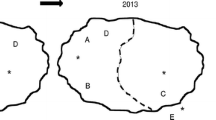Abstract
In some circumstances, politicians set about altering the composition of their electorate with a view to increasing their chances of being re-elected. A hypothesis along these lines is formulated in the context of local elections and residential mobility. Although the hypothesis is general, an assessment of its validity implies auxiliary assumptions related to a specific spatio-temporal context. That is done with reference to conditions prevailing in post-war French metropolitan areas. In the empirical part of the paper, some of the implications are submitted to tests on demographical and political data. On the basis of the tests, and although alternative explanations of the findings are possible, the hypothesis can be said to be corroborated.
Similar content being viewed by others
References
Edelson, N.M. (1976). Voting equilibria with market-based assessments. Journal of Public Economics 5 (May): 269–284.
Epple, D., and Zelenitz, A. (1981). The implications of competition among jurisdictions: Does Tiebout need politics? Journal of Political Economy 89 (December): 1197–1217.
Epple, D., Filimon, R., and Romer, T. (1984). Equilibrium among local jurisdictions: Toward an integrated treatment of voting and residential choice. Journal of Public Economics (August): 281–308.
Henderson, J.V. (1985). The Tiebout model: Bring back the entrepreneurs. Journal of Political Economy 93 (April): 248–264.
Hutchison, T.W. (1981). The market economy and the franchise, or 1867 and all that. In The politics and philosophy of economics: Marxians, Keynesians and Austrians. Oxford: Basil Blackwell.
Kesselman, M. (1974). Research perspectives in comparative local politics: Pitfalls, prospects, and notes on the French case. In T.N. Clark (Ed.), Comparative community politics. New York: Wiley.
Klaassen, L.H., and Scimemi, G. (1981). Theoretical issues in urban dynamics. In L.H. Klaassen, W.T.M. Molle and J.P.H. Paelinck (Eds.), The dynamics of urban development. New York: St. Martin's Press.
Mehay, S.L. and Seiden, K.P. (1986). Municipal residency laws and local public budgets. Public Choice 48.1: 27–35.
Rose-Ackerman, S. (1979). Market models of local government: Exit, voting, and the land market. Journal of Urban Economics 6 (July): 319–337.
Rothenberg, J. (1977). Endogenous city-suburb governmental rivalry through household location. In W.E. Oates (Ed.), The political economy of federalism. Lexington, MA: D.C. Heath (Lexington Books).
Salmon, P. (1987). Decentralisation as an incentive scheme. Oxford Review of Economic Policy 3.2 (Summer): 24–44.
Tiebout, C. (1956). A pure theory of local expenditures. Journal of Political Economy 64 (October): 416–424.
Yinger, J. (1982). Capitalization and the theory of local public finance. Journal of Political Economy 90 (October): 917–943.
Author information
Authors and Affiliations
Additional information
Earlier versions of this paper were presented at the 1986 Meeting of the European Public Choice Society and at the 1986 Journées de Microéconomie Appliquée. We are grateful for the comments and suggestions made on these occasions or independently by Jean Bénard, Albert Breton, Giorgio Brosio, Gérard Charreaux, Louis Duquesne de la Vinelle, Gianluigi Galeotti, François Gardes, Roger Guesnerie, Jean-Dominique Lafay, Claude Meidinger, Bernard Nonat, Werner Pommerehne, Alain Wolfelsperger, and an anonymous referee. Any remaining errors and shortcomings are our sole responsibility. We also thank the Institut de Mathématiques Appliquées for research support.
Rights and permissions
About this article
Cite this article
Mingat, A., Salmon, P. Alterable electorates in the context of residential mobility. Public Choice 59, 67–82 (1988). https://doi.org/10.1007/BF00119450
Issue Date:
DOI: https://doi.org/10.1007/BF00119450




